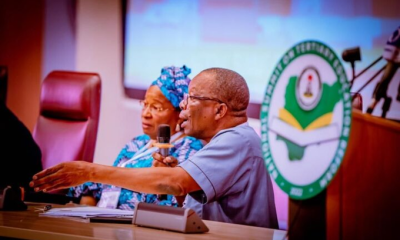Editorial
ASUU: A strike and the sorry state of education (1)

The just suspended eight month strike by tertiary university lecturers collectively organised under the aegis of the Academic Staff Union of Universities, ASUU has definitely come as a huge relief to millions of Nigerians but the mere fact that an industrial dispute of this nature had even gone that whole distance is definitely most troubling.
Broken down, the prolonged dispute and its poor management smacks of a cross between crass irresponsibility on the part of the supervising Federal Government of Nigeria and a perplexed and recalcitrant Academic Staff Union of Universities, ASUU that seemed to have lost focus and direction, and so colossally pushed to a wholesale defensive.
Given the original idea of the university as a lightening rod for new and fresh advances and innovations in society, this is a stark and quite distressing reflection of how very deep the crisis of public tertiary education is in the country at the moment.
As a business newspaper that is preeminently focused on finding a lasting solution to the crisis that is at hand, it is important that all the various lessons learned and perspectives gleaned as regards this saga have to be most critically examined. This is more so as it is very clear to all discerning observers that the current respite as regards the suspension of the strike is only temporary.
It is important therefore, to keep an eye on the ball and to build upon the travesty of this experience, a more fitting conclusion in which the deeply entrenched challenges of the public tertiary education complex would have been very rigorously dissected and addressed. That indeed would be the only consolation that would make sense at the end of the day.
In doing this, it is important to review how helpful, or unhelpful, some of the manouvres taken by the parties in the conflict have been. In this, one of the most distressing fact is government’s attempt to break the strike through encouraging the formation of parallel bodies in the university environment.
While this may have come in handy as part of the jostling for advantage that the nation witnessed in the ding-dong between the parties, it is important to make the simple point that balkanisation of university unions is solution to nothing. Indeed, it contains within it seeds for even further acts of balkanisation that could lead to a total breakdown of industrial harmony within the public tertiary education complex. Not everything indeed is fair in war as in peace.
Another related point is the policy of no-work no-pay. While it is important that a society be governed by rules and laws, there is also a corresponding responsibility for such rules and laws to be realistic, just, and above all, enforceable.
Besides, given the reality that lecturers occupy a high end segment of the labour force that cannot be readily dismissed and recruited while also guaranteeing commensurate system stability and credibility, it is necessary that a regime of more and more negotiations on this subject is the cheaper and more beneficial way to go.
Besides, it is also necessary to take judicial notice of some of the arguments that have been canvassed by the lecturers on this point, including their giving guarantees that they would sacrifice a lot of their statutory rest time in order to compensate for some of the time already used up by the unfortunate crisis.
It is in this wise and for these reasons that we urge that in this instance, the insistence on the no-work no-pay policy would not exactly help in advancing the desired goal. We therefore, call for it to be reviewed as a mark of negotiation in good faith and to help avoid further escalation of a yet charged situation.
Going forward, we endorse the view that agreements freely reached should be honoured, and where it is impracticable to continue to do this, should be calmly and consensually reviewed. In this regard, we find it very baffling and unacceptable the attitude of Federal Government negotiators to proceed along with a take it or leave it approach.
In the same vein and going forward, we call on ASUU to equally review their positions as regards the long-standing agreements and bring to the table new, creative and helpful proposals that would not only help in resolving the currently yet simmering conflict but to comprehensively renew or even reinvent and deepen the systems and structures that are needed to give the nation a top-rate and globally competitive public university system.







